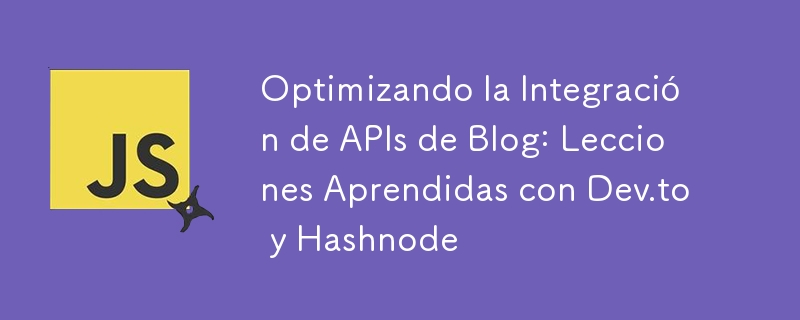
在 Astro 开发我的个人作品集期间,我遇到了一个有趣的挑战:如何有效地集成我的 Dev.to 和 Hashnode 帖子,而不必每次发帖时都重建网站新内容?
问题一开始似乎很简单:在一个页面上显示我来自两个平台的所有帖子。然而,我遇到了一些挑战:
我在 Astro 中创建了一个无服务器端点,它结合了两个平台的帖子:
export const GET: APIRoute = async () => {
const [hashnodePosts, devtoPosts] = await Promise.all([
getHashnodePosts(),
getDevToPosts()
]);
const allPosts = [...hashnodePosts, ...devtoPosts]
.sort((a, b) =>
new Date(b.rawDate).getTime() - new Date(a.rawDate).getTime()
);
return new Response(JSON.stringify(allPosts), {
headers: {
'Content-Type': 'application/json',
'Cache-Control': 'no-store, no-cache, must-revalidate'
}
});
};
关键是请求尽可能多的帖子数:
// Para Dev.to
const params = new URLSearchParams({
username: 'goaqidev',
per_page: '1000', // Máximo número de posts
state: 'published'
});
// Para Hashnode
const query = `
query {
publication(host: "goaqidev.hashnode.dev") {
posts(first: 1000) { // Máximo número de posts
edges {
node {
title
brief
// ...otros campos
}
}
}
}
}
`;
为了确保内容新鲜,我实施了反缓存策略:
const timestamp = new Date().getTime();
const response = await fetch(`/api/posts.json?_=${timestamp}`, {
headers: {
'Cache-Control': 'no-cache',
'Pragma': 'no-cache'
}
});
为了保持界面最新,我创建了一个 React 组件来处理加载和更新帖子:
import { useState, useEffect } from 'react';
function BlogPosts() {
const [posts, setPosts] = useState([]);
const [loading, setLoading] = useState(true);
useEffect(() => {
const fetchPosts = async () => {
try {
const timestamp = new Date().getTime();
const response = await fetch(`/api/posts.json?_=${timestamp}`);
const data = await response.json();
setPosts(data);
} catch (error) {
console.error('Error fetching posts:', error);
} finally {
setLoading(false);
}
};
fetchPosts();
// Actualizar cada 5 minutos
const interval = setInterval(fetchPosts, 5 * 60 * 1000);
return () => clearInterval(interval);
}, []);
if (loading) return <div>Cargando posts...</div>;
return (
<div className="grid grid-cols-1 md:grid-cols-2 lg:grid-cols-3 gap-4">
{posts.map(post => (
<article key={post.id} className="card">
<h2>{post.title}</h2>
<p>{post.brief}</p>
<a href={post.url}>Leer más</a>
</article>
))}
</div>
);
}
我实现了一个强大的错误处理系统:
async function fetchPosts() {
try {
const response = await fetch('/api/posts.json');
if (!response.ok) {
throw new Error(`HTTP error! status: ${response.status}`);
}
const posts = await response.json();
return posts;
} catch (error) {
console.error('Error fetching posts:', error);
// Intentar cargar desde caché local si está disponible
const cachedPosts = localStorage.getItem('blog_posts');
return cachedPosts ? JSON.parse(cachedPosts) : [];
}
}
为了进一步提高性能,我实施了:
// Guardar posts en localStorage
localStorage.setItem('blog_posts', JSON.stringify(posts));
// Cargar posts desde localStorage mientras se actualiza
const cachedPosts = localStorage.getItem('blog_posts');
if (cachedPosts) {
setPosts(JSON.parse(cachedPosts));
}
function PostImage({ src, alt }) {
return (
<img
loading="lazy"
src={src}
alt={alt}
className="w-full h-48 object-cover"
/>
);
}
该解决方案已被证明是稳健且高效的,使我能够:
我计划实施:
以上是优化博客 API 集成:Dev.to 和 Hashnode 的经验教训的详细内容。更多信息请关注PHP中文网其他相关文章!




